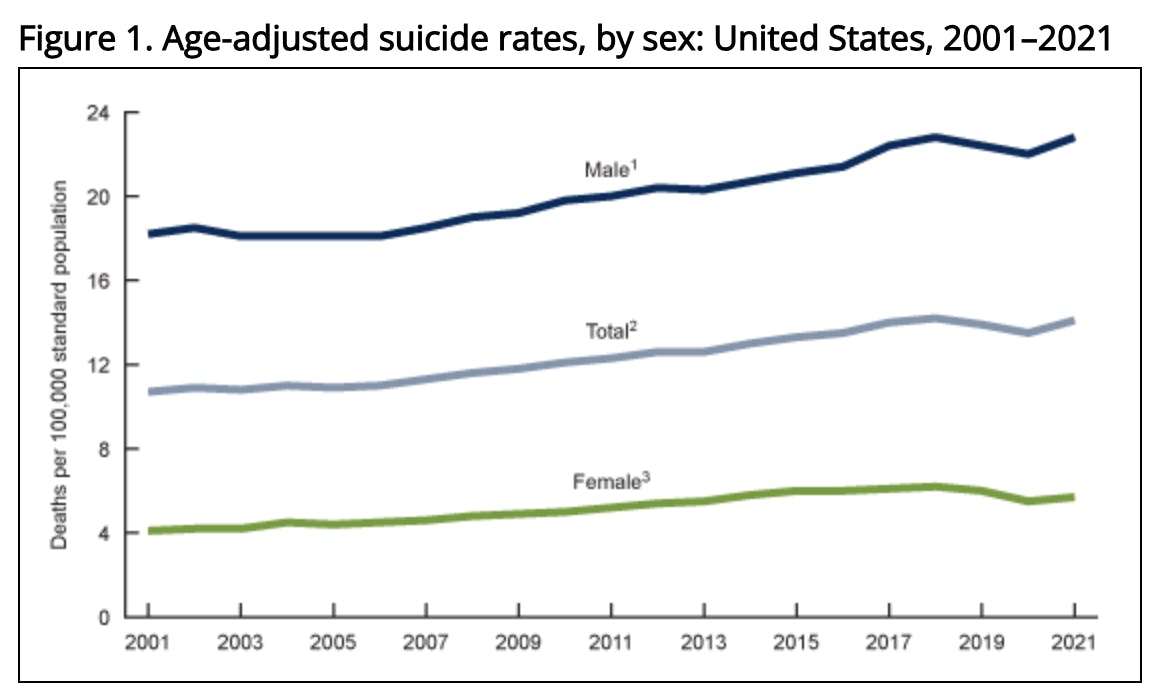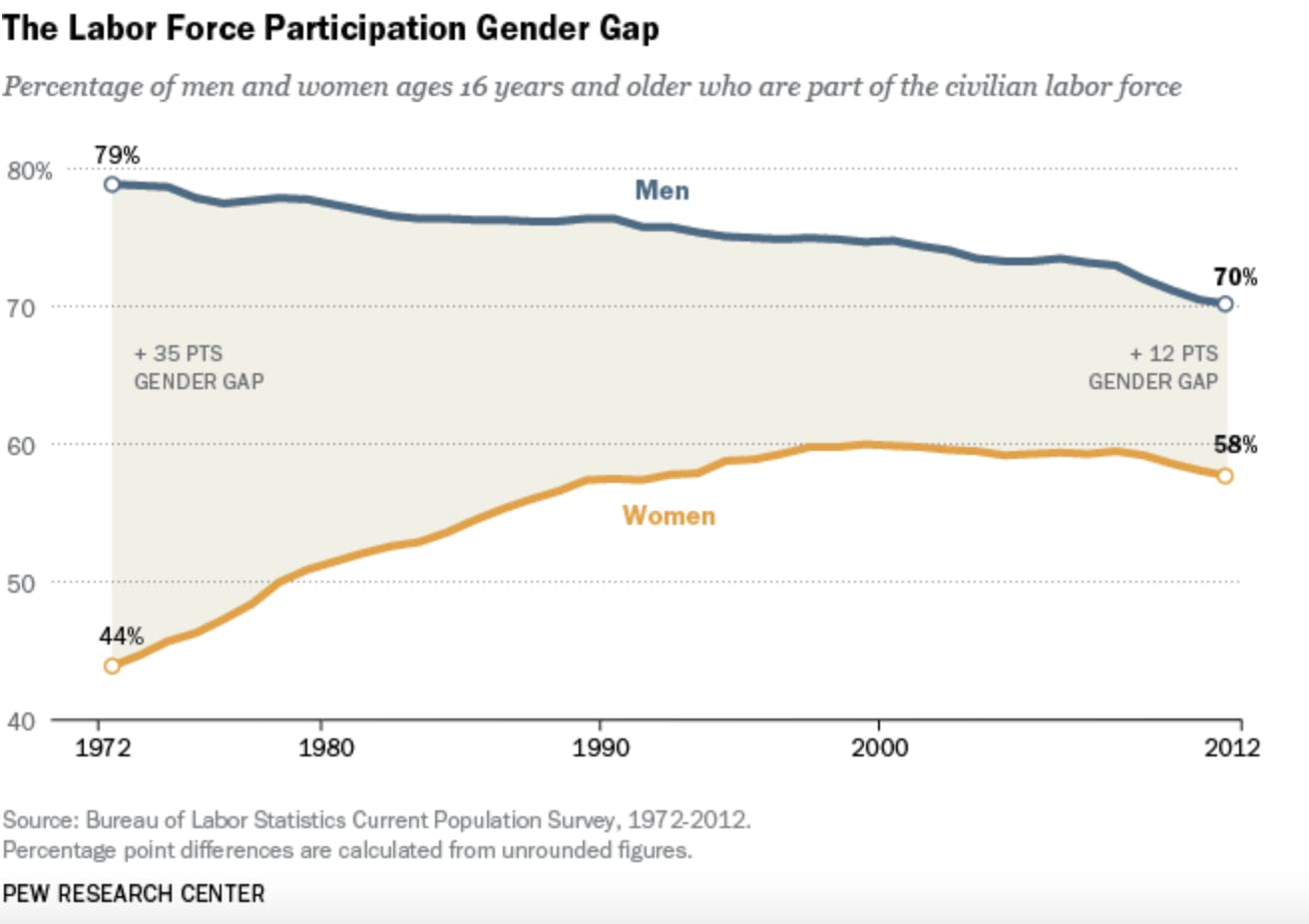Who we deem worthy of compassion says more about us than almost anything else.
We feel compassion for endangered species, whose habitats disappear because of our choices, so we set up protected land areas.
We feel compassion for children in third world countries, whose lives are ripped apart by warfare and natural disasters, so we donate money to worthy charities.
We feel compassion for minority groups who appear inordinately crushed by things like poverty, housing, and healthcare, so we take action in our local communities to remedy it.
Want to see compassion sucked right out of the room? Mention men.
Before we throw them under the bus, we need to consider this: if we feel compassion for populations that are hurting, left behind, and in trouble, men must be included. They might even be near the top of that list.

Men have a life expectancy 5 years less than women. They are 4x more likely to commit suicide than women. Men are 2x more likely to have a substance abuse related incident than women. One in five men reports having no friends at all, while 44% of men say they feel lonely “sometimes, often, or all the time.” Since 1972, the percentage of men in the workforce has dropped by 9%, while women have increased by 14%. I could go on and on, but you get the point.

Men are drowning, and our culture has no intention of throwing them a lifeline.
I understand why that kind of compassion is difficult. Some boys (I use that term purposefully) have abused their power, influence, and strength to get what they want—no questions asked, with no devastation too high a price to pay. No matter their age, status, or influence, they were not men. They were boys.
Not all males are boys, and most of the ones who are don’t want to stay that way. But the way forward is foggy. We don’t know where to go, what to do, or who to even ask for help. So we numb out with our drug of choice: streaming, scrolling, sex, or substances.
In most of anthropological history, boys were initiated into manhood. They passed a difficult test and crossed a line. From that day forward, the men in their tribe looked them in the eye, called them men, and treated them differently. That day and age is gone, and we are reaping the effects.
Even as the PhDs debate whether the world needs men any more, I will stand up and be a voice to the contrary: men matter—to the world, to their communities, to their families, and to God. When they are at their best, men bring a vision for a better tomorrow. They take minority positions to stand against passivity. They support teams that better life for everyone. They work hard, and they protect the vulnerable around them.
If you Google something like “Do We Still Need Men?,” the results are depressing.
No one would ever publish a scholarly article entitled “Does the World Really Need Women?” It’s a nonstarter, as it should be. Women obviously matter, and we naturally have compassion for them. We hate to see them hit glass ceilings. We hate to hear it when they have to endure sexual comments in the workplace or in public. We hate it when they are disregarded or ignored because of their gender.
Compassion for one group doesn’t mean we can’t have compassion for the other. Can we feel compassion for the plight of women, while simultaneously feeling compassion for men who our culture is content to let flounder? I think we can. We should and we must expand our compassion bucket.
The best way to build compassion is to listen.
A few years ago, I self-published a book entitled The Five Marks of a Man. One of the copies found its way into the hands of a municipal court judge in my hometown. He liked it so much, he started assigning the book as a part of sentencing and probation.
Below are excerpts from letters written by young men in the juvenile detention system who read the book. Each young man (you heard right, “man,” not “boy,”) below has experienced the spiral of tough situations, bad choices, and tragic mistakes. And from the letters I’ve been able to read from them, they are owning their past and pushing forward into a better future.
Can we grow our compassion buckets to have room for men? What about men behind bars? If we listen, I think we can. In taking the time to hear their stories, we realize our lives aren’t so dissimilar. We are all just a few choices away from a drastically different existence.
Let these snapshots from their lives build a bridge inside you, not a wall. Names have been changed to protect identities.
“I learned in this book that Men are team players. I believe this is the mark I flounder with. I am constantly saying, “I want to do it by myself.” I always thought that being independent makes you a man. I now realize that it takes a real man to ask for help or to work as a team. I thought running away from home at times was showing I was a man and could support myself. In reality, I was displaying boyish actions, running away from my problems.” - Nick
“The first thing I need to fix in my life is to actually create a vision for myself. I have always lived for today and never thought about the future. I know that when I’m older, I want to be a mechanic. So in order to make this dream a reality, I need to focus on a path to help me get there. That is having vision.” - Terrance
“After reading this book, I realize there are many steps to becoming a man, it’s not as simple as just turning 18. I see that being a protector means more than stepping into physical situations. Getting a job, investing money, paying rent on time are, too. I am going to handle ways to protect people a lot differently now.” - Jordan
Who do you have trouble finding compassion for? Find a way to listen to that person, or someone from that population, this week.
Compassion grows when we listen—and a little more compassion in our world could go a long way.
I have just released the definitive edition of The Five Marks of a Man, as well as a companion Tactical Guide, an initiation rite to work the marks into your life. If you, or someone you love, are looking for a map to leaving boyhood behind, these tools are a great place to start. Go to briantome.com/fivemarks.










